How UK-born James Chau became a presenter on Chinese state TV
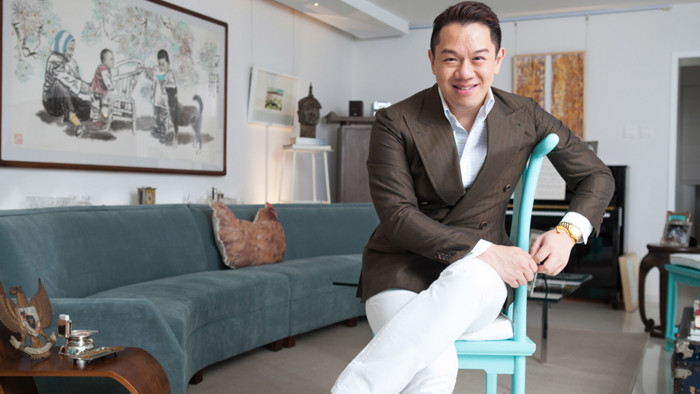
Simply sign up to the Life & Arts myFT Digest -- delivered directly to your inbox.
The Soviet-style apartment block in Beijing, set behind a luxury sports car dealership and a showroom for a private aircraft manufacturer, doesn’t seem like the kind of place someone who is used to broadcasting to 85m television viewers would choose to live in.
It is also a far cry from the gleaming China Central Television (CCTV) headquarters, the distinctive tower nicknamed “big trousers” by locals – as much a reference to its design as it is a fitting metaphor for the state broadcaster’s size and reputation. Founded in 1958, CCTV’s 40 channels are today beamed around the world to a potential 1bn viewers, with programming that ranges from news and academic lectures to variety shows and historical dramas. The state-owned national broadcaster, always led by a senior Communist party official, is also regularly described as a mouthpiece for the Chinese government.
James Chau, 36, has worked for CCTV for more than a decade; first as a primetime news anchorman and today as a special contributor focusing on major news and special events. He also has 1.6m followers on Weibo, China’s version of Twitter. Inside his ground-floor, two-bedroom apartment, warm light from an inset balcony floods the living room, which has a curved jade-coloured sofa and a large painting of a grandmother and two children posing in a rural Chinese setting.
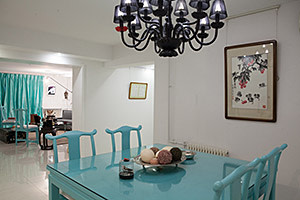
Dressed in a brown blazer and white trousers, Chau is all smiles and has a disarming sense of humour – two characteristics he has put to good use throughout his career. He was the first Chinese journalist to interview Aung San Suu Kyi, arguably the world’s most famous living dissident, while other interviewees have included Robert Mugabe (who after the show asked Chau if he was married, and why not), China’s first lady Peng Liyuan, and fashion designer Diane von Furstenberg (who told him that if she were a 20-year-old today, she would live in Beijing rather than New York). Chau was also the first journalist to secure a one-on-one interview with Malaysia’s defence minister and acting transport minister after the disappearance of Malaysia Airlines Flight 370 in March.
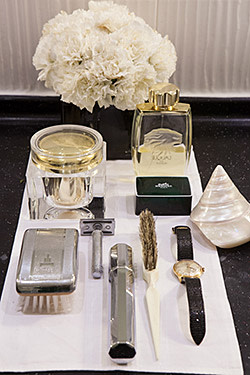
Chau recalls the first time he visited his apartment. “[The building was] so ugly on the outside. But the friends I was with said, ‘Give it a chance. You don’t know what’s inside’. It’s sort of a metaphor for life – that content is more important than the packaging.”
The apartments were originally built for senior government officials and Chau has lived here for 10 months. The flat is three times larger than his previous home but Chau moved here for personal reasons, following a loss in his life. “I wanted an unfamiliar space that was not associated with anyone. I feel calm when I walk in”. Ground-floor living and the unassuming exterior also feels safer to him than any of the modern high-rises he has lived in previously.
Beautiful artworks hang on the walls – as well as more unusual objects such as the lightbox-mounted X-ray of his mother’s shoulder (“She almost always wears pearls; apparently when being X-rayed for a dislocated shoulder, too”).
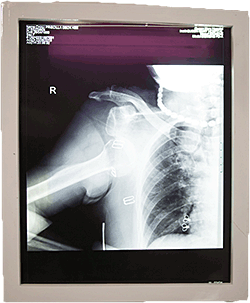
Born in London, his father was raised in Hong Kong while his mother was born to “ethnic Chinese parents from Indonesia and Malaysia”. Chau entered the Royal Academy of Music aged 12 to study piano but stopped playing at 16 after a car accident. After receiving his masters at Cambridge he moved to Hong Kong to work in television and, 10 years ago, moved to Beijing. “I didn’t know anybody. I came to China to learn – not just about a rising power but about a country which in itself contains the biggest chunk of the human family. I wanted to learn what most of the world was doing”.
He landed his role at CCTV after speculatively calling the broadcaster and asking for a job. “It’s about having guts and honesty and knowing what you want – and what you can offer in return,” he says.
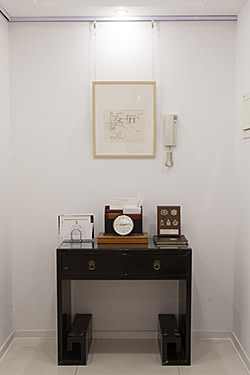
When asked what it is like being western-born and educated but working, ultimately, for the Chinese government, Chau gives the kind of response one might expect from a star journalist at a state broadcaster. “You are working for a combination of elements – a news station, government agency and a country. Quite often what you read in the paper and watch on television gives you a clear idea of where China is headed next – what policy it may be testing out further. Being the first to share that is very special – it makes the station a true influencer”.
Days after this interview, thousands of demonstrators took to the streets in Hong Kong as part of a pro-democracy protest. Unsurprisingly, CCTV’s coverage of what became known as the Umbrella Revolution was decidedly pro-Beijing. Yet, Chau later insists: “If we look at it broadly, this has been an object lesson in responsible democracy. The authorities have made their point, the protesters have made their point and they went back to their respective work. This leaves open the argument to dialogue – and Beijing has always said that, in any situation, it is open to dialogue.”
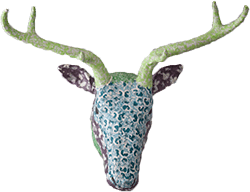
Chau leads the way into the “red room” – painted, partly, as a nod to “Forbidden City red” and partly as homage to the photographer Lord Snowdon, formerly Princess Margaret’s husband, and who Chau interviewed when he was at Cambridge. The red room is a multifunctional space – study, guest room, retreat – where Chau sees himself spending more time in the future. In August, Chau announced emotionally on air that he was stepping down as an anchorman to become a special contributor for CCTV. It would give him the opportunity to escape the “everyday humdrum of going to the studio” as well as enabling him to cut down on travel to make time to finish his book – a collection of interviews with “global thought leaders” such as Arianna Huffington and Muhammad Yunus.
Favourite thing
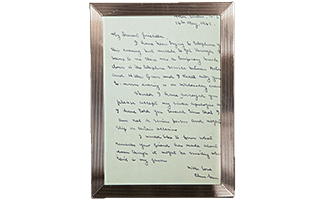
A letter Chau’s father wrote to his mother in 1962, two years before they married. “I have been trying to telephone you this evening but unable to get through,” the letter begins, “and it seems to me there was a temporary breakdown in the telephone service between Acton and Hither Green . . . should I have annoyed you, please accept my sincere apologies”.
Chau, who is single, says of the letter: “I love using a few words, which are love, kindness and humility. If you allow people into your life . . . those need to be the pillars for me.”
Chau also wants to focus on his HIV/Aids work (he is a goodwill ambassador for UNAIDS – the joint UN programme on HIV/Aids, for which Chau was appointed in 2009, as UNAIDS’s first ambassador to China).
Several other journalists have also left CCTV recently but under very different circumstances. Nearly a dozen top CCTV employees have been targeted in the sweeping anti-corruption campaign of China’s president Xi Jinping, which has ensnared both businessmen and government officials. Some 63,000 have been punished, from stripped party memberships to death sentences.
Did Chau know any of the CCTV staff who have been detained? “I knew one person in particular whom I worked with when I was coming up. So that came as a surprise.” When pushed further, Chau again tows the party line. “I think no one needs to be afraid, apart from the people who are corrupt themselves,” he says. “I support the president’s anti-corruption campaign, as do all Chinese people. Who wouldn’t? It costs the country billions every year and everyone is sick of it.”
Warming to his theme, he continues: “This is going to be the legacy of this presidency because [Xi] has the courage, capacity and opportunity now – not to say that others haven’t been wanting to do it. He has taken this incredible bold step to create a new standard here.”
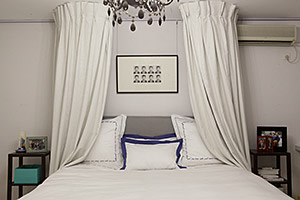
Chau’s bed, which is made up in white and blue trimmed sheets, is framed by white curtains that hang from the ceiling. “I had this madcap idea recently in London. I didn’t want a four-poster – I find it very old, and my ceilings aren’t high enough – so, with two guys and a drill, we created this effect ourselves.” Of the design, he adds, smiling: “It’s a bit English, a bit Napoleonic – which is all a bit aspirational of me to say, because that makes me somewhere between a queen and an emperor.”
Given the worsening air pollution in China, does Chau have any air filters? If he does, they are well concealed. “I actually have three. But I hide them because they’re ugly.” Still, Chau says the pollution hasn’t deterred him from staying on in Beijing, as it has so many expats as well as locals. “It’s not going to keep me from living here – and living my dream.”
Photographs: Fang Yifei
Comments